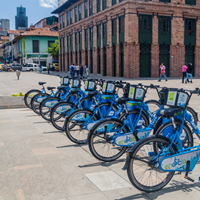Pros and Cons of Living in Colombia
Summary: If you're moving to Colombia, it's important to learn about both the Pros AND Cons of living in Colombia.
Welcome to the vibrant tapestry that is Colombia, a land of lush landscapes, rich culture, and a warm, inviting atmosphere. For those considering a move to this South American gem, the decision comes with a complex blend of advantages and challenges. Colombia has been steadily gaining popularity among expatriates, digital nomads, and retirees, drawn by its diverse offerings and unique lifestyle. As with any international move, it's essential to weigh the pros and cons carefully. In this feature, we delve into the multifaceted experience of living in Colombia, providing insights and anecdotes to help you make an informed decision about your potential new home.
Pros of Living in Colombia
Imagine waking up to the sound of exotic birds, sipping locally-grown coffee as you gaze out at the Andean peaks or Caribbean coastline. This is the daily reality for many who have chosen to call Colombia home. The nation's allure is not just in its postcard-worthy views; it's also in the warmth of its people, the richness of its culture, and the surprisingly affordable cost of living.
One of the most significant advantages of living in Colombia is the cost of living. Housing, groceries, transportation, and entertainment are all available at a fraction of the cost you might expect in North America or Europe. For example, in cities like Medellín and Cali, one can rent a comfortable apartment in a good neighborhood for less than half of what you'd pay for a similar space in a major US city. This affordability extends to healthcare as well, which is not only cost-effective but also of high quality, with several hospitals in major cities accredited by international organizations.
Colombia's healthcare system is a beacon for expatriates seeking quality medical care without the exorbitant costs associated with it in their home countries. Anecdotes abound of foreigners who have undergone complex procedures or received comprehensive medical treatments at a fraction of the cost they would have incurred elsewhere, all without compromising on quality. The country's healthcare professionals are well-trained, often with international experience, and the facilities are equipped with modern technology.
Another compelling reason to consider Colombia as a new home is the climate. With its equatorial position and varied topography, Colombia offers a range of climates to suit any preference. Whether you're drawn to the eternal spring of Medellín, the tropical warmth of Cartagena, or the cooler, more temperate climate of Bogotá, there's a perfect spot for everyone. The biodiversity here is unmatched, with opportunities to explore rainforests, mountains, beaches, and deserts all within the same country.
For those with a taste for adventure and natural beauty, Colombia is a paradise. The country boasts some of the most diverse flora and fauna on the planet, with national parks like Tayrona offering pristine beaches and lush jungle treks. Birdwatchers and nature enthusiasts will find themselves in heaven, with countless species to observe in their natural habitats. The country's commitment to conservation and sustainable tourism means that these treasures are preserved for future generations to enjoy.
Cultural richness is another of Colombia's hallmarks. The country's history is a tapestry woven from indigenous, African, and Spanish threads, creating a vibrant cultural fabric. Festivals like Barranquilla's Carnival and Medellín's Flower Festival are just a taste of the exuberant celebrations that take place throughout the year. Music and dance are integral to Colombian life, with genres like cumbia, salsa, and vallenato providing the soundtrack to daily life.
Colombians are known for their hospitality and friendliness, often going out of their way to help newcomers feel at home. Expatriates frequently recount stories of being invited to local homes for meals or being assisted with navigating bureaucratic processes. This openness extends to the expat communities that have taken root in various cities, where newcomers can find support and camaraderie as they adjust to their new surroundings.
Finally, for those who work remotely or have flexible careers, Colombia's growing digital infrastructure makes it an attractive destination. Major cities like Bogotá, Medellín, and Cali have seen a surge in co-working spaces, and internet connectivity is generally reliable and fast. This has fostered a burgeoning community of digital nomads and entrepreneurs, further enriching the expatriate experience.
From the affordable cost of living to the welcoming culture, the advantages of life in Colombia are as diverse as its landscapes. Each city and region offers its own unique perks, allowing for a lifestyle that can be tailored to individual preferences and needs. Whether you're seeking adventure, relaxation, or a vibrant cultural scene, Colombia presents a compelling case as a place to call home.
Cons of Living in Colombia
While the allure of Colombia's vibrant culture and stunning geography is undeniable, it's important to acknowledge the challenges that come with living in this dynamic country. As with any destination, there are downsides that must be considered before packing your bags and booking a one-way ticket.
One of the most pressing concerns for potential expatriates is safety. Despite significant improvements in recent years, Colombia still grapples with issues related to crime and personal security. While the days of notorious drug cartels dominating headlines are largely in the past, petty crime, such as theft and pickpocketing, remains a reality, particularly in larger cities. Expatriates often share stories of having to adopt heightened awareness and taking precautions like avoiding certain areas at night or not displaying valuables in public.
Another challenge is the bureaucratic system, which can be a source of frustration for those accustomed to more streamlined processes. Establishing residency, opening a bank account, or even getting utilities set up can involve a maze of paperwork and patience-testing delays. The pace of life is slower, and the 'mañana' attitude can be both a blessing and a curse, depending on one's perspective and urgency.
While the cost of living is generally low, expatriates should be aware that imported goods and certain services can be surprisingly expensive due to tariffs and taxes. Electronics, vehicles, and branded clothing often carry a hefty price tag, which can be a shock for those who are used to lower prices in their home countries. Additionally, while local cuisine is delicious and affordable, those craving international flavors might find themselves paying a premium for familiar dishes.
Language can also be a barrier for those who do not speak Spanish. While English is taught in schools and spoken by some in the major cities, a basic level of Spanish is essential for day-to-day life and deeper integration into the community. Expatriates recount experiences of miscommunication and misunderstandings that can range from comical to inconvenient, highlighting the importance of learning the local language.
Infrastructure in Colombia can vary greatly depending on the region. While major cities boast modern amenities, rural areas can lack reliable access to roads, healthcare, and internet services. This can be a significant drawback for those who desire the tranquility of the countryside but also require the conveniences of modern living.
For those with children, the education system in Colombia presents a mixed bag. While there are excellent international schools in larger cities, they can be expensive, and the quality of public education varies widely. Parents often find themselves weighing the benefits of a local education against the costs and logistics of private or international schooling.
Lastly, the political landscape in Colombia is complex and can be a source of uncertainty for residents. While the country has made strides towards stability, protests and strikes are not uncommon and can disrupt daily life. Expatriates must stay informed and sometimes adapt their routines to accommodate the ebb and flow of the political climate.
Living in Colombia is not without its challenges, from navigating safety concerns to dealing with bureaucracy and infrastructure issues. The cost of certain goods and services, language barriers, and considerations around education and political stability are all factors that must be weighed against the undeniable charm and benefits of Colombian life. It's a country that demands resilience and adaptability from its residents, but for many, the rewards of embracing its rhythm and spirit far outweigh the drawbacks.
Ultimately, the decision to move to Colombia should be made with a full understanding of both the pros and cons. Those who do choose to make the leap often find that the country's beauty, culture, and people make it a place not just to live, but to thrive. It's a land of contrasts, where challenges exist alongside opportunities for a rich and fulfilling life.
Expats Talk about Pros & Cons of Living in Colombia
"I love Villavicencio, the llanero and the rivers and the culture is amazing. It has all the modern conveniences with many large malls and great restaurants. Guanajuato at Prima Vera is as close to TexMex as it gets. Bastimento has amazing American and traditional dishes. Overall has many wonderful day trips in the area," commented one member living in Villavicencio, Colombia.
About the Author
 Joshua Wood, LPC joined Expat Exchange in 2000 and serves as one of its Co-Presidents. He is also one of the Founders of Digital Nomad Exchange. Prior to Expat Exchange, Joshua worked for NBC Cable (MSNBC and CNBC
Primetime). Joshua has a BA from Syracuse and a Master's in Clinical and Counseling Psychology from Fairleigh Dickinson University. Mr. Wood is also a licensed counselor and psychotherapist.
Joshua Wood, LPC joined Expat Exchange in 2000 and serves as one of its Co-Presidents. He is also one of the Founders of Digital Nomad Exchange. Prior to Expat Exchange, Joshua worked for NBC Cable (MSNBC and CNBC
Primetime). Joshua has a BA from Syracuse and a Master's in Clinical and Counseling Psychology from Fairleigh Dickinson University. Mr. Wood is also a licensed counselor and psychotherapist.
Some of Joshua's articles include Pros and Cons of Living in Portugal, 10 Best Places to Live in Ireland and Pros and Cons of Living in Uruguay. Connect with Joshua on LinkedIn.
Additional Information:
- Colombia Guide
- Healthcare & Health Insurance in Colombia
- Members Talk about Healthcare & Health Insurance in Colombia
- Best Places to Live in Colombia
- Real Estate in Colombia
- Guide to Real Estate in Colombia
- Pros & Cons of Living in Colombia
- Cost of Living in Colombia
- Having a Baby in Colombia
- Health Insurance for Expats in Colombia
- Best Places to Visit in Colombia for Christmas Cheer
- Christmas in Colombia
- 2025 Guide to Living in Colombia
- Pros and Cons of Living in Colombia 2025
- 2025 Guide to Moving to Colombia




